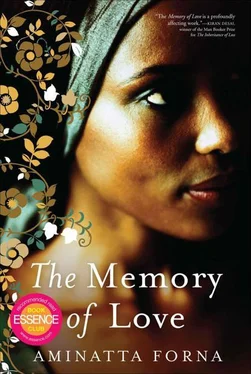That night, for the first time in many weeks, Adrian takes out his drawing pad and pencil and begins to sketch. He draws the fruit bats in the tree in the yard of the new house. For half an hour he struggles with a soft pencil to capture a likeness: the intense darkness of their faces, the brilliance of their eyes and small teeth, the elegance and fragility of their wings. He uses a flashlight to get close to them and they seem unperturbed. One of the bats is carrying a baby upon her body. Gradually he discerns differences between them, of character and features. After a while he reviews his work. There are several sketches. The first a study of the head of a bat. The second an image of the mother and her baby. A third of a spread wing: sheer matt skin, taut edges and graceful points. It seems to him unimaginable he ever found these creatures ugly. Quite simply, they are beautiful.
‘I like that.’ Mamakay, who has stolen up behind him, places her hands on his shoulders. ‘Can I see?’
He holds up the sketchbook for her.
‘May I keep it?’ she asks.
‘Of course.’ He takes the sketchbook and tears out the page. Mamakay disappears and comes back with an empty frame. Adrian turns the pages of the pad, back to the earliest sketches of the sunbird outside the apartment at the hospital. He thinks of Kai and wonders if he still sleeps there. Or if Mamakay still thinks of him.
‘There!’ Mamakay holds up the drawing of the bats inside the frame. He smiles at her. Yes, it is one of his best. The best he has done since he came here.
Late in the evening, long after they have eaten and made love, he picks up his sketchbook again. Mamakay is lying on the wicker sofa; a lappa is wrapped around her body, twined around to the back of her neck, where it is caught in a heavy knot.
The rain is gone and the evening air is light. The heat, for once, has slipped back into the earth. A breeze toys with the hem of Mamakay’s garment. The city seems very far away. He watches her for a long time, the sketchbook lying in his lap. It is hard to resist the urge to touch her. She is reading in the yellow lamplight, lying on her back and holding the book inches from her nose, her other arm thrown behind her. She lays the book upon her chest but otherwise remains as she is. Adrian picks up his pencil.
This night he draws her, eschewing studies and sketches, endeavouring to capture every line of her body. One by one, the lines fall upon the paper, each in its place. He works with intense concentration, can feel the tightness in his stomach. He is alive in the moment, nervous of making the next stroke, but knowing at the same time he cannot stop or whatever rhythm, whatever alchemy of brain and eyes and fingers that currently propels him will be lost. Once on paper, the moment will be held for ever, he can never forget it. He wills Mamakay not to move. On he draws until the precise moment comes when he is finished. Perhaps for the first time, he recognises the moment as it arrives. Not a single stroke erased or redrawn. The picture of Mamakay is a series of lines, curved and tapering. A curl of hair, the soft swell of her stomach. It is unlike anything he has ever drawn before.
‘If you like bats so much, I can take you somewhere.’
He’d thought her asleep, she’d lain so still.
Where are they? Adrian has no idea. He turns to see the canoe, steered by the old fisherman with his single, narrow paddle, head back into the waves. A cannon lies half submerged. A small jetty reaches to the sea. A fort, ruined stone, thickly veined with creepers, stands above them. Mamakay’s stride is shorter now than before, her breathing labours slightly. It is already late, perhaps six o’clock.
A path leads away from the small, gritty beach towards the interior of the island, past a graveyard in which stand half a dozen headstones. Adrian stops to read the names upon them and wonders what it took, all those years ago, to have words carved upon Scottish granite and brought back to be laid upon the tomb of a sailor whose own lifespan upon this island had lasted only a matter of months. A row of undulating mounds stands almost as tall as Adrian. Hills of oyster shells, thousands upon thousands, marking long-ago years, when the men who lived here dined on oysters and rum; the bottles lie upon the beach, are wedged between the boulders, rock back and forth upon the sea bed.
They are walking downhill now, away from the oyster hills, a narrow path around the edge of a disintegrating wall.
‘Here.’ Mamakay turns and stops. They are in front of a doorway, or perhaps it is the mouth of a cave. Adrian leans into the narrow portal. A colossal, crowded darkness, seething with life, the sound of a billion beating hearts. To Adrian it feels as if the island itself is a living creature, whose centre the two of them have penetrated.
Outside, in front of the cave opening, they wait for night. As the darkness outside deepens, they hear inside the cave a stirring, awakenings. The first bat emerges, noiselessly, and is gone. It is followed by other bats, singly and then in twos and threes, leaving slipstreams of wind, treacle-soft and warm. Now in tens and twenties, finally in their hundreds, bats fly past them. Adrian stands unmoving, holds his breath for the minutes it takes for the bats to leave the cave. The air is turbulent with wings, dense with bodies. Threads of wind trail across his face and arms, seem to cling to him. The wind brings the tears to his eyes and he closes them. They are everywhere, above him, around him, though they never touch him. Their numbers seem unending, until suddenly everything comes to a halt. Adrian finds himself standing holding Mamakay in his arms. The breath comes fast and hard from their lips, their bodies tremble. They are holding each other, laughing.
Adrian opens his eyes and is instantly awake. The sun is strong and the sky a deep blue. It is the morning of his meeting with Elias Cole. Twenty minutes later looking into Elias Cole’s face, Adrian finds himself searching for traces of Mamakay. There, in the line of the lips, the contour of the eyes, the slight prominence of the upper teeth. And when Cole smiles, as he did when Adrian entered, the likeness was there in the bottom lip, where it caught on and was pushed forward by the edge of the front teeth. How strange it is to see the face of a young and beautiful woman hidden within the folded curtains of an elderly man’s skin. It occurs to Adrian he and Elias Cole are practically kin.
Cole removes the breathing apparatus from his face.
‘Good morning,’ says Adrian. Somehow seeing Cole like that makes him draw several deep breaths, like a thirsty man drinking water.
‘Good morning.’ The voice as dry as paper.
‘How are you getting on?’
Cole shrugs. ‘I have nothing to complain of.’
The air in the room is cooler than outside. Grateful for this, Adrian sits in his customary seat. Over the last two days he has reread his clinical notes in their entirety. Even after he had done so Elias Cole still retained a certain opacity. As a man he was possessive, controlling and ambitious, though none of those to a degree that was by any means pathological. His was a case of mediocrity rising. If he’d been possessed of any real talent he would have been seen as a threat by the Dean and eliminated like so many others. He had allied himself with the Dean and ridden on the back of the Dean’s ambition. When the Dean became Vice Chancellor he promoted Cole to his old position. In England Adrian met people like Elias Cole every day; some of them were his colleagues. Cole was jealous of his younger brother, whom he also loved. Parallels there between the brother and Julius. Cole had alluded to them himself. In some ways he appeared to know himself well, which made whatever he was concealing all the more cleverly hidden. Unless of course the occlusion was taking place on the level of the subconscious. Adrian doubted this. He suspected Cole had been manipulating him.
Читать дальше












